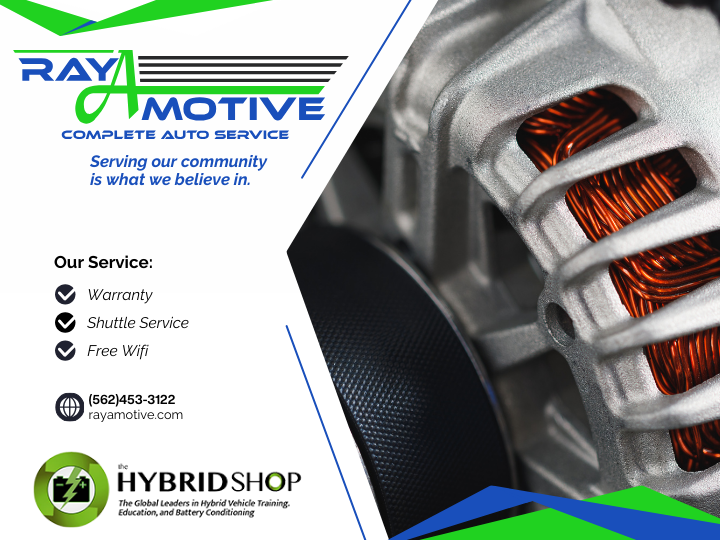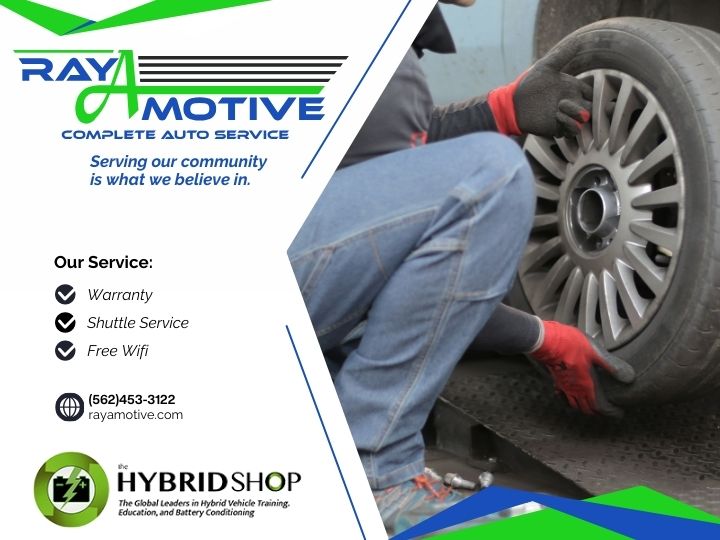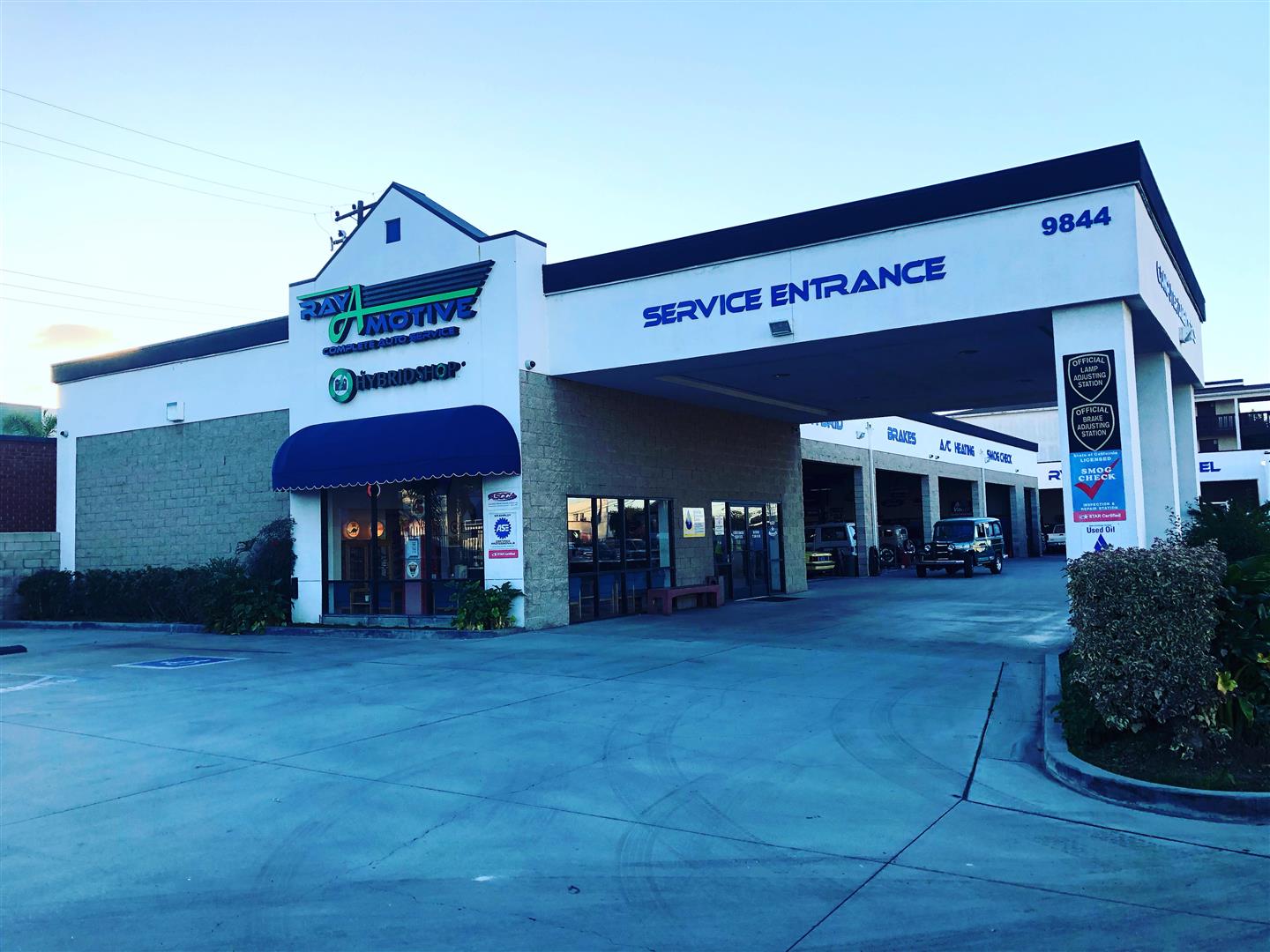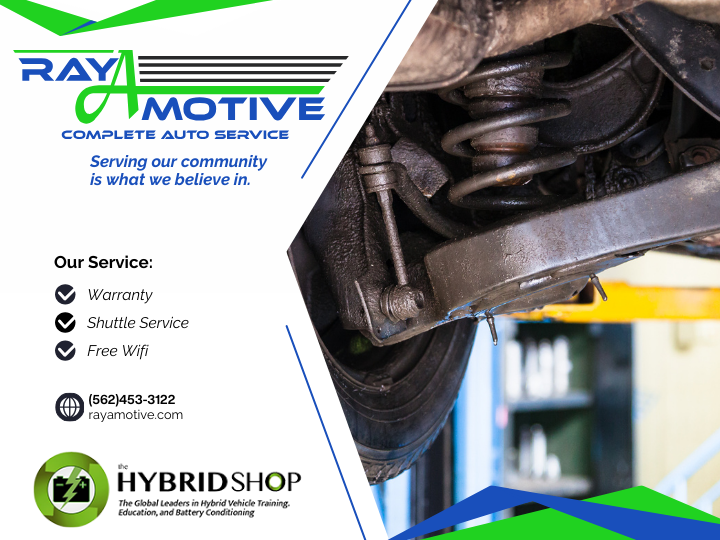Posted on 12/30/2024

Ray-A-Motive: Reliable Auto Repair Services in Bellflower, CA When your vehicle needs attention, whether for routine maintenance or unexpected repairs, you deserve a repair shop you can trust. Ray-A-Motive, located in Bellflower, California, has built a reputation for providing dependable, high-quality automotive services. From expert diagnostics to efficient repairs, their experienced team ensures your car is in excellent hands. About Ray-A-Motive Address: 9844 Artesia Blvd, Bellflower, CA 90706 Phone: (562) 866-2169 Website: rayamotive.com Ray-A-Motive has been a cornerstone of the Bellflower community for years, offering comprehensive automotive repair and maintenance services. Their commitment to excellence and customer satisfaction has made them a trusted name for drivers in the area. Equipped with advanced diagnostic tools and staffed by ASE-certified technicians, Ray-A-Motive delivers top-notch service for all vehicle m ... read more
Posted on 12/23/2024

Ray-A-Motive: Your Trusted Partner for Alternator Repairs in Bellflower, CA Your car’s alternator is the heart of its electrical system, responsible for keeping the battery charged and powering essential components like your headlights, air conditioning, and onboard electronics. When the alternator fails, your vehicle can quickly lose power, leaving you stranded and frustrated. For drivers in Bellflower, CA, Ray-A-Motive is the trusted name for reliable, professional alternator diagnostics and repairs. Located at 9844 Artesia Blvd, we’re committed to getting you back on the road safely and quickly. What Makes the Alternator So Important? Your vehicle relies on the alternator to generate the electricity needed to power everything from the engine to your electronics. It also ensures the battery remains charged so you can start the car again the next time you drive. Key systems powered by the alternator include: Headlights, taillights, and interior lighting ... read more
Posted on 12/16/2024

Why Does My Car Vibrate at High Speeds? Have you noticed your car vibrating at high speeds? While it might seem like a minor inconvenience, vibrations are often a sign of deeper mechanical issues that need immediate attention. Ignoring these signs can lead to costly repairs or even safety hazards. At Ray-A-Motive, located at 9844 Artesia Blvd, Bellflower, CA, we specialize in diagnosing and resolving vehicle issues, including high-speed vibrations. Call us at (562) 866-2169 or visit rayamotive.com to schedule an appointment. With over 30 years of experience, we pride ourselves on delivering top-quality service with integrity. Let’s explore the common causes of car vibrations and why addressing them promptly is essential. Common Causes of Car Vibrations at High Speeds 1. Unbalanced Tires Unbalanced tires are a leading cause of car vibrations. Even minor imbalances can cause your car to shake as you pick up speed. Here&rs ... read more
Posted on 12/9/2024

Comprehensive Guide to Battery Replacement at Ray-A-Motive in Bellflower, CA When it comes to vehicle maintenance, one of the most critical components to keep in top-notch condition is your car’s battery. Without a functioning battery, your car simply won’t start, leaving you stranded and frustrated. Ray-A-Motive, located conveniently at 9844 Artesia Blvd, Bellflower, CA, has been serving the community with exceptional automotive care, including top-tier battery replacement services. If you’re dealing with a sluggish start or suspect your battery is on its last legs, Ray-A-Motive is your go-to destination. Understanding the Role of Your Car Battery Your car battery serves as the heart of your vehicle’s electrical system. It provides the necessary power to start your engine and supports various electronic components, such as lights, radio, and advanced safety systems. In modern vehicles, the battery’s role extends beyond ignition, as it also powers compl ... read more
Posted on 12/2/2024

"Rotten Egg Smell in Your Car? Ray-A-Motive in Bellflower, CA, Can Help!" Introduction: A Common but Serious Car Odor If your car smells like rotten eggs, it’s more than just an unpleasant experience—it’s a sign that something is wrong with your vehicle’s internal systems. At Ray-A-Motive in Bellflower, CA, we specialize in diagnosing and fixing the root causes of this odor. Whether it’s a catalytic converter issue, a malfunctioning sensor, or an exhaust leak, we’re here to ensure your car is running efficiently and odor-free. What Causes the Rotten Egg Smell in Your Car? The sulfuric, rotten egg smell originates from hydrogen sulfide, a byproduct of fuel combustion. Normally, your car’s catalytic converter processes this gas, but malfunctions can allow the smell to escape. Here are the most common culprits: Catalytic Converter Failure Your catalytic converter is responsible for neutralizing toxic g ... read more
Posted on 11/29/2024

How Do I Know If My Car Needs Brakes? Ray-A-Motive’s Guide for Bellflower Drivers Navigating the streets of Bellflower, CA, requires a vehicle with a braking system you can rely on. Whether you’re commuting down Artesia Boulevard, exploring nearby Los Angeles, or simply running errands, your brakes are essential to your safety and the safety of others on the road. At Ray-A-Motive, we specialize in expert brake repair and maintenance, ensuring your vehicle is equipped to handle any driving condition. In this guide, we’ll break down the common signs of brake issues, why brakes wear out, and how Ray-A-Motive can help keep your vehicle’s braking system in top condition. The Importance of Brakes for Bellflower Drivers Bellflower’s urban environment demands frequent braking, whether it’s navigating traffic on major roads or stopping at numerous intersections. With the added impact of Southern California’s hot summers and occasional ... read more
Posted on 11/25/2024

Do I Need a Good Relationship with My Mechanic? Absolutely—Here’s Why When it comes to maintaining and repairing your car, there’s one thing that often gets overlooked: your relationship with your mechanic. Sure, it might seem like a simple transaction—you bring your car in, they fix it, you pay, and you leave. But in reality, it’s much more than that. Having a strong, honest relationship with your mechanic is essential, not just for the health of your vehicle but for your own peace of mind. After all, your mechanic plays a vital role in ensuring the safety and reliability of the machine you depend on every day. Let’s dive into why this relationship matters and how you can make it work for both parties. Mechanics: Modern-Day Rocket Scientists First, let’s address a common misconception: mechanics are not just “grease monkeys.” Far from it. Modern vehicles are marvels of engineering, combining advanced technologies ... read more
Posted on 11/21/2024

Finding the Right Auto Repair Shop Near You: Building Trust and Getting Quality Service When it comes to finding an auto repair shop or mechanic “near me,” it’s about more than just location. Sure, proximity matters, but if you’re looking to save money, maintain your car’s performance, and ensure safety, you need to build a relationship with a trusted auto repair shop or technician. Simply picking the closest mechanic isn’t enough if you want the job done right and at a fair price. Establishing a strong connection with an experienced automotive professional can make all the difference in your car ownership experience, especially for the long haul. In this guide, we’ll discuss what to look for when searching for a “mechanic near me,” how to identify a quality shop, and why trusting your technician is crucial. Why Finding the Right Technician is Key In the automotive industry, professionals are often called “technicians,&rdq ... read more
Posted on 11/18/2024

Is Having a Maintenance Schedule Important for My Car? Understanding the Dealership vs. Aftermarket Debate When it comes to maintaining your vehicle, the seemingly simple task of following a service schedule can feel confusing. Should you rely on the factory-recommended maintenance intervals, follow your dealership’s advice, or listen to your trusted local mechanic or aftermarket specialist? Each has its own recommendations, but at the end of the day, proper maintenance is essential if you want your car to last and perform optimally. Let’s break down the details and discuss how a well-thought-out maintenance schedule can keep your car on the road for hundreds of thousands of miles. Why Regular Maintenance is Essential First things first: why does your car need regular maintenance? Many parts in a vehicle experience wear and tear simply from everyday use. Fluids degrade, filters get clogged, and moving parts wear down. Following a consistent maintenance schedule helps add ... read more
Posted on 11/14/2024

Why Shocks and Struts Are Essential for Your Vehicle and When to Replace Them Shocks and struts are often taken for granted, but they play a critical role in the comfort, handling, and safety of your vehicle. Understanding their function and importance, along with knowing the right time for replacement, is crucial for every car owner. Here, we’ll cover what shocks and struts do, why they’re necessary, and why it’s often recommended to replace them around 75,000 miles as a part of preventive maintenance. What Are Shocks and Struts? Shocks and struts are key components of your vehicle’s suspension system, working to ensure stability, comfort, and control on the road. 1. Shocks (Shock Absorbers): Shock absorbers are hydraulic devices designed to control the movement of your vehicle’s springs, especially when driving on uneven or rough terrain. The springs absorb most of the initial impact, and shocks help manage this energy by controlling t ... read more